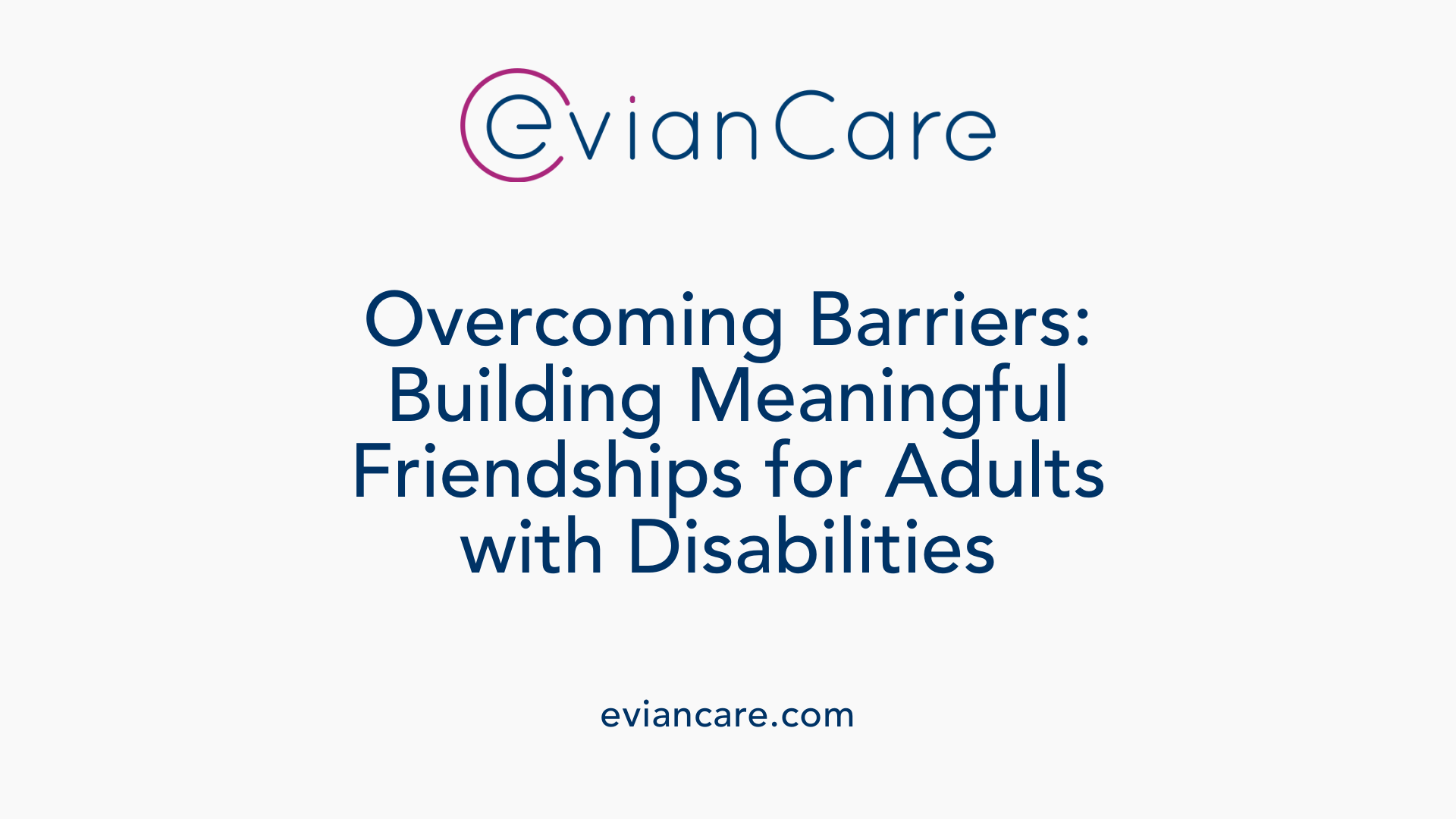
Building Bridges: The Power of Friendship for Adults with Disabilities
Friendships are essential for enriching the lives of adults with disabilities, offering emotional support, reducing loneliness, and fostering community involvement. Despite societal barriers, various strategies and resources can facilitate meaningful relationships, ultimately promoting well-being and independence.
The Importance of Friendships for Adults with Disabilities

Why are friendships important for adults with disabilities?
Friendships play a crucial role in the well-being of adults with disabilities. They provide vital mental health benefits by offering emotional support and companionship, which are essential for reducing feelings of loneliness and social isolation.
Engaging in meaningful social interactions helps individuals share experiences and interests, fostering a sense of belonging and acceptance within the community. These relationships can boost confidence, enhance social skills, and encourage participation in community activities.
Research shows that adults with disabilities often encounter barriers such as inaccessible venues and societal attitudes, which hinder their ability to build and maintain friendships. Supporting inclusive activities, accessible social programs, and digital communication options can help overcome these challenges.
Building and nurturing friendships not only improves personal happiness but also supports independence and community involvement. Encouraging participation in local clubs, volunteer opportunities, and online communities can expand social networks and enrich the lives of adults with disabilities.
Ultimately, fostering friendships enhances overall quality of life, providing both practical and emotional benefits. Reliable social connections contribute to improved mental and physical health, helping individuals thrive and feel valued in their communities.
Supporting Strategies for Building Positive Friendships

What are effective strategies for supporting adults with disabilities in building positive friendships?
Supporting adults with disabilities in developing meaningful friendships involves various approaches tailored to their unique needs and preferences. A person-centered methodology is fundamental, emphasizing the importance of understanding and prioritizing the individual's interests, cultural background, and comfort levels.
Community activities and groups centered around shared interests serve as excellent platforms for social interaction. Participating in local clubs, hobby groups, or interest-based meetups, like art classes, gardening clubs, or adaptive sports, can create natural opportunities for connection. These environments encourage engagement and foster bonds over common passions.
Developing communication skills is another vital aspect. Techniques such as using open-ended questions, practicing active listening, and utilizing digital communication tools like text messaging or social media can help build rapport and ease social anxiety. Encouraging conversations around shared interests helps establish a foundation for friendship, making social interactions more enjoyable and less intimidating.
Maintaining friendships requires ongoing effort and commitment. Simple acts like staying in regular contact, remembering important dates, and showing genuine support contribute to long-lasting relationships. Supportive environments must also be inclusive and accessible, with venues that accommodate mobility and sensory needs, ensuring all individuals have equal opportunity to participate.
Additionally, consistent social skills development is essential. Support programs that teach positive body language, emotional regulation, and conflict resolution empower adults with disabilities to navigate social settings confidently. Building these skills can significantly increase the chances of forming and maintaining fulfilling friendships.
In summary, fostering friendships for adults with disabilities involves a combination of person-centered planning, active participation in community groups, effective communication practices, accessible social environments, and ongoing social skills training. These strategies collectively help individuals build supportive, enriching relationships that enhance their overall well-being.
Tips for Caregivers and Support Providers

How can caregivers and support providers encourage participation in social activities?
Caregivers and support providers play a vital role in helping adults with disabilities engage in social activities. They can initiate and support participation in community events, hobbies, adaptive sports, and recreational classes tailored to individual interests and abilities. Organizing regular outings like nature walks, art workshops, or movie nights provides natural opportunities for peer interaction.
Creating accessible, age-appropriate, and inclusive environments helps reduce barriers, making social participation more meaningful. Supporting involvement in group activities fosters social skills and encourages ongoing friendships. Facilitating connections through volunteer opportunities or social clubs based on shared interests can greatly enhance social networks.
Why is modeling social skills and emotional intelligence important?
Supporting adults with disabilities to develop social skills starts with modeling positive behaviors. Caregivers can demonstrate empathy, active listening, and respectful communication. Leading by example helps individuals learn how to interpret social cues and practice self-regulation.
Encouraging emotional intelligence components like self-awareness, internal motivation, and empathy enables individuals to build genuine relationships. When caregivers show patience and understanding, they create a safe environment for individuals to explore social interactions, fostering confidence and independence.
How can reciprocal interactions and buddy systems support friendship building?
Promoting reciprocal interactions involves encouraging adults to take initiative in social settings, such as inviting peers to activities or sharing their interests. Buddy systems pair individuals with supportive peers who can assist in socializing, reducing feelings of isolation.
Activities like shared hobbies or community involvement initiatives offer opportunities for mutual engagement. Supporting consistent, positive interactions in a supervised setting builds trust and encourages friendships to flourish naturally.
What steps should be taken to promote accessible and inclusive environments?
Ensuring venues are accessible—considering physical access, sensory accommodations, and clear signage—removes common barriers to participation. Support providers should advocate for inclusive policies in community centers, parks, and social clubs.
Offering a variety of activities tailored to diverse needs and interests encourages involvement from individuals with disabilities. Training staff in inclusive practices and promoting an accepting attitude among all participants fosters a welcoming environment conducive to friendship building.
How does technology aid in social connections?
Using technology like social media, messaging apps, and video calls can help adults with disabilities maintain friendships beyond in-person interactions. Online platforms allow individuals to stay connected with friends and family, share updates, and participate in virtual communities.
It’s important to follow online safety practices, such as not sharing personal information and attending meet-ups in public places. Proper guidance and supervision ensure technology use remains positive and supportive of expanded social networks.
Through these approaches—encouraging active participation, modeling emotional skills, supporting mutual interactions, creating accessible environments, and leveraging technology—caregivers and support providers can significantly enhance friendship opportunities for adults with disabilities, enriching their lives and promoting mental well-being.
Resources and Tools to Foster Social Connections

What resources and tools are available to promote social connections for adults with disabilities?
A wide range of resources and tools are designed to support adults with disabilities in building and maintaining social connections. Research-based videos and publications provide valuable insights and practical advice on establishing friendships, understanding relationships, and overcoming social barriers. The Friendship Project, for example, offers videos and materials that address challenges like shyness and fear of rejection, guiding individuals through social skill development.
Community programs and initiatives also play a vital role. Programs such as Opportunity Centers facilitate social activities in safe, supportive environments where adults can pursue hobbies, learn new skills, and connect with peers. Peer support schemes like Gig Buddies match adults with learning disabilities to volunteers for cultural outings, fostering shared experiences and friendships.
Assistive technology and digital tools further enhance social participation. Communication devices, social media platforms, and apps tailored for accessibility enable individuals to connect online safely. Platforms such as Cognitopia support employment and independent living, encouraging social engagement beyond traditional settings.
Online platforms, including social media sites, forums, and virtual events, provide opportunities for community involvement and friendship building. Resources such as webinars, virtual training sessions, and online support groups allow adults to participate from home while developing social skills and expanding their networks.
Legal and advocacy organizations offer essential support to promote inclusive participation. The ADA and local advocacy groups work to eliminate barriers and ensure accessible community activities. Initiatives like Safe Soulmates and True Friendships Project focus on creating safe, inclusive environments for building meaningful relationships.
In summary, a combination of educational content, community programs, technological aids, and advocacy efforts creates a comprehensive support system. These tools help adults with disabilities connect, communicate, and participate fully in community life, ultimately enriching their social well-being and quality of life.
Challenges in Building Friendships and Solutions

What challenges do adults with disabilities face in building friendships, and how can they be addressed?
Adults with disabilities often encounter a variety of barriers that can hinder their ability to form and maintain friendships. Societal attitudes and stigma are significant issues, as negative perceptions and stereotypes about disabilities can lead to social exclusion and loneliness. Many physical environments are not fully accessible, making it difficult for individuals to participate in community activities or social events.
Communication difficulties also pose challenges, especially for those with intellectual disabilities or speech impairments. These difficulties can cause misunderstandings or discomfort in social settings, creating a sense of alienation. Societal biases further exacerbate these issues by reinforcing feelings of inadequacy or difference.
Fear of rejection or vulnerability is common among adults with disabilities, making them hesitant to reach out or engage in new social interactions. Concerns about the stability of friendships, especially when health issues or support needs change, can also prevent forming close bonds.
To overcome these obstacles, it is essential to promote inclusive environments that value diversity and foster understanding. Support services and community programs, such as social clubs or interest-based groups, provide safe spaces for interaction. Support workers play a vital role by helping individuals develop social skills and navigate social settings comfortably.
Engaging in activities aligned with personal interests, whether through hobby groups, adaptive sports, or community volunteering, can also help build genuine relationships. Peer mentoring programs and anti-ableist friendships encourage authentic, empathetic connections. These strategies not only reduce loneliness but also reinforce a sense of belonging and community participation.
Creating a supportive culture that respects personal boundaries, offers accessible venues, and values diversity can significantly improve the social experiences of adults with disabilities. As society becomes more inclusive, opportunities for meaningful friendships grow, enhancing overall well-being and mental health.
Creating a Supportive Community for All
Fostering friendships among adults with disabilities is a vital component of their overall well-being and social inclusion. By implementing person-centered strategies, providing accessible and inclusive opportunities, leveraging community and digital resources, and fostering understanding and empathy, society can significantly reduce barriers and create a welcoming environment. Support from caregivers, professionals, and peers is essential in building trust and reciprocal relationships that last. As we continue to advocate for inclusive policies and programs, we move closer to a world where every adult with a disability can enjoy the companionship, support, and sense of belonging that healthy friendships provide.
References
- The importance of friendship for people with disability - Northcott
- Encouraging Friendships for People with Special Needs
- 7 Tips for Making Friends: A Guide for Adults with Intellectual ...
- The Friendship project: making and keeping friends for people with ...
- Supporting friendships - Choice Support
- Easy Ways to Make Friends When You Have Developmental ...
- 6 Ways To Be A Better Friend To A Disabled Person - Forbes
- [PDF] Friendships in People with Intellectual Disabilities
- 3 Tips to Building Lasting Friendships for People With Autism or a ...












